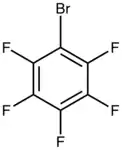 | |
| Names | |
|---|---|
| Preferred IUPAC name
Bromopenta(fluoro)benzene | |
| Other names
Bromoperfluorobenzene | |
| Identifiers | |
3D model (JSmol) |
|
| ChEMBL | |
| ChemSpider | |
| ECHA InfoCard | 100.005.863 |
| EC Number |
|
PubChem CID |
|
| UNII | |
CompTox Dashboard (EPA) |
|
| |
| |
| Properties | |
| C6BrF5 | |
| Molar mass | 246.962 g·mol−1 |
| Appearance | colorless liquid |
| Density | 1.9503 g/cm3 |
| Melting point | −31 °C (−24 °F; 242 K) |
| Boiling point | 137 °C (279 °F; 410 K) |
| low | |
| Hazards | |
| GHS labelling: | |
 | |
| Warning | |
| H315, H319, H335 | |
| P261, P264, P271, P280, P302+P352, P304+P340, P305+P351+P338, P312, P321, P332+P313, P337+P313, P362, P403+P233, P405, P501 | |
Except where otherwise noted, data are given for materials in their standard state (at 25 °C [77 °F], 100 kPa).
Infobox references | |
Bromopentafluorobenzene is an organofluorine compound with the formula C6F5Br. It is a colorless liquid that is used to prepare pentafluophenyl compounds. These syntheses typically proceed via the intermediacy of C6F5Li or the Grignard reagent.[1] Illustrative is preparation of tris(pentafluorophenyl)borane:[2]
- 3 C6F5MgBr + BCl3 → (C6F5)3B + 3 MgBrCl
Other derivatives include LiB(C6F5)4,[3] [CuC6F5]4,[1] and Ni(C6F5)2(dioxane)2.[4]
References
- 1 2 Allan Cairncross; William A. Sheppard; Edward Wonchoba (1979). "Pentafluorophenylcopper Tetramer, A Reagent for Synthesis of Fluorinated Aromatic Compounds". Org. Synth. 59: 122. doi:10.15227/orgsyn.059.0122.
- ↑ Piers, W. E.; Chivers, T. “Pentafluorophenylboranes: from Obscurity to Applications”, Chemical Society Reviews, 1997, 26, 345-354. doi:10.1039/cs9972600345
- ↑ Tanaka, Katsunori; Fukase, Koichi (2007). "Lithium tetra(pentafluorophenyl)borate". e-EROS Encyclopedia of Reagents for Organic Synthesis. doi:10.1002/047084289X.rn00752. ISBN 978-0471936237. S2CID 96944152.
- ↑ Sanchez, G.; Momblona, F.; Sanchez, M.; Perez, J.; Lopez, G.; Casabo, J.; Molins, E.; Miravitlles, C. (1998). "Synthesis of Homo- and Heterobimetallic Complexes Containing the Ni(C6F5)2 Moiety. Crystal Structure of [(C6F5)2Ni(μ-SPh)2Pd(dppe)]". Eur. J. Inorg. Chem. 1998 (8): 1199–1204. doi:10.1002/(SICI)1099-0682(199808)1998:8<1199::AID-EJIC1199>3.0.CO;2-K.
This article is issued from Wikipedia. The text is licensed under Creative Commons - Attribution - Sharealike. Additional terms may apply for the media files.